The most aerodynamic cars on sale today
It may be invisible, but aerodynamics has a big impact on a car’s efficiency
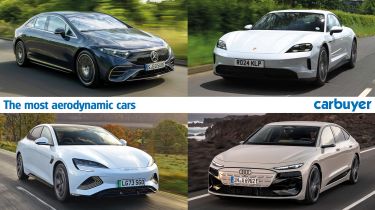
It’s fairly easy for us to judge how spacious, practical, or good-looking a new car is, but there’s an invisible element at play that isn’t so obvious – aerodynamics. Sure, your car buying decision is unlikely to be swayed by the aerodynamics of a particular model, but it’s an interesting factor that has real world implications for a car’s fuel consumption or electric range.
A car with a more aerodynamic body can cut through the air more easily at high speeds, reducing fuel or electricity consumption. Since many electric car buyers consider range to be a top priority, car designers are paying greater attention to aerodynamics to maximise the distance a car can travel on a single charge. As a result, we’re seeing more and more sleek and slippery EVs hit the market – a trend that’s expected to continue.
You’ll recognise several cars from our list of the longest-range electric cars here, as the two often go hand-in-hand. However, not all the cars on this list are electric, proving that manufacturers are still invested in making their combustion cars as efficient as possible, too.
1. Mercedes EQS
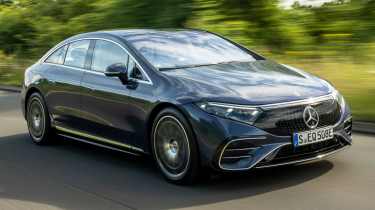
- Drag coefficient: 0.20 Cd
The electric equivalent of the S-Class, the Mercedes EQS is one of the most luxurious EVs that the German car maker offers. Despite its large, limo-esque proportions, the EQS is the most aerodynamic car you can buy in the UK, with a rock-bottom drag coefficient of 0.20.
Stood next to its petrol-powered sibling, it's clear where Mercedes’s designers found the aerodynamic gains for the EQS. It takes on a smoother silhouette, trading the traditional three-box saloon design of the S-Class for a coupe-esque look. With no need for a big radiator grille, the EQS gets a blanked-off panel instead, while the wheels have been designed to minimise drag, too. Love it or loathe it, the design has clearly had the intended effect – the EQS currently achieves the longest range of any EV on sale in the UK, at around 480 miles.
2. Hyundai Ioniq 6
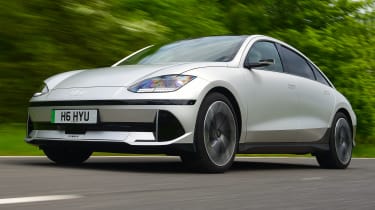
- Drag coefficient: 0.21 Cd
The Hyundai Ioniq 6 took everyone by surprise when it launched in 2022. It uses the same electric platform as the Ioniq 5 family car, but its styling couldn’t be any more different. Inspired by ‘streamliner’ vehicles of the early 20th century, the Ioniq 6 gets a sleek roofline that stretches from the windscreen to behind the rear wheels in a single swoop, resulting in a unique appearance unlike anything on sale today.
Its drag coefficient of 0.21 is helped by a low nose and clean front bumper design – the opposite of today’s big, upright SUVs. Things are fairly neat and tidy at the back, too, with a small spoiler to control the airflow.
3. Audi A6 e-tron
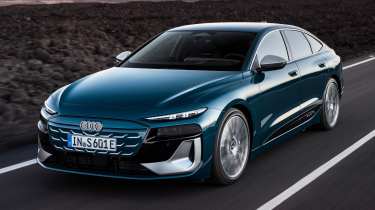
- Drag coefficient: 0.21 Cd
Audi has followed the trend set by Mercedes and Hyundai above for its new A6 e-tron Sportback. While the old A6 used a conventional three-box saloon body, the new model has transitioned into a four-door coupe, with a sloping roofline to improve its aerodynamic efficiency. As a result, its coefficient of drag has dropped to just 0.21 – down from the old car’s figure of 0.24 – making it the most aerodynamic Audi ever built.
That’s useful, as the A6 has transitioned from a combustion-engined car into an electric-only model. It’ll manage up to 466 miles of range, while the A6 Avant e-tron estate will go 447 miles on a charge.
4. Lotus Emeya
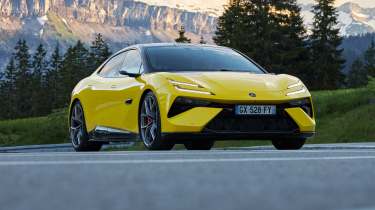
- Drag coefficient: 0.21 Cd
Looking at the current Lotus lineup, you might assume the sleek Emira sports car is the most aerodynamic model. However, its drag coefficient of 0.349 looks almost astronomical alongside the Lotus Emeya. The new electric saloon has been designed with aero at the top of the agenda, and the resulting drag coefficient of 0.21 proves that the British brand nailed the brief.
The Emeya is positioned as a rival to the Porsche Taycan and Audi e-tron GT, boasting up to 905bhp in ‘R’ specification. That’s nearly eight times as powerful as the original Lotus Elise, but at around 2,500kg, the Emeya is about three and a half times as heavy. Still, with a super-slippery body, it’ll manage up to 379 miles of range.
5. BYD Seal
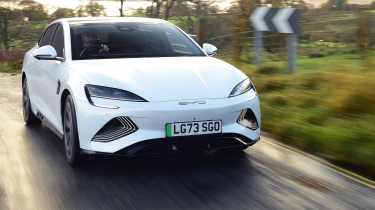
- Drag coefficient: 0.219 Cd
BYD was a relatively unknown name in the UK not so long ago, but it’s slowly gaining ground with its range of affordable electric cars. The BYD Dolphin picked up our Carbuyer Best Car award for 2024, but it’s the Seal that finds its way onto this list with its drag coefficient of 0.219. The electric saloon has been designed as a Tesla Model 3 or Hyundai Ioniq 6 rival, with impressive tech to match its sleek looks.
It’s obvious from the first glance that the Seal has been designed with aero in mind. Its unfussy design with soft curves works well to cut through the air with minimal resistance. Even though the roofline slopes towards the back of the car, rear-seat headroom is still good enough for six-foot passengers to sit in comfort.
6. Mercedes A-Class Saloon
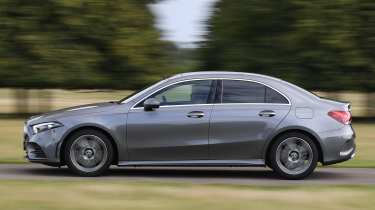
- Drag coefficient: 0.22 Cd
Not only is the Mercedes A-Class Saloon the most affordable car on this list, it's also the only combustion-engined model. It’s available with a choice of petrol, diesel and plug-in hybrid engines, nestled within a small saloon body that earns a drag coefficient of just 0.22 – only 0.02 behind the flagship Mercedes EQS.
Upon its launch in 2018, Mercedes claimed that it was the most aerodynamic car on sale in the world, and it remains top of the pack if you exclude EVs. It offers the same classy interior as the regular A-Class hatchback, but it gets a slightly larger boot and the rear seats are just as spacious.
7. Porsche Taycan
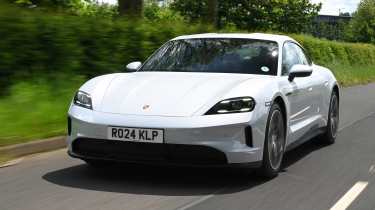
- Drag coefficient: 0.22 Cd
Porsche’s first foray into the electric car market was nothing short of a total success, with the Taycan launching to widespread acclaim. Its performance is hugely impressive – especially in top-spec Turbo S trim – but a large part of the Taycan’s appeal lies in its sci-fi looks. You’ll struggle to find a straight edge on the Taycan, with every curve contributing to its 0.22 drag coefficient.
Like many of the cars on this list, the Taycan is a four-door saloon that’s dressed up as a coupe. The sloping roofline and muscular rear haunches closely resemble its Porsche 911 sibling, but it’s the EV that takes the trophy for aerodynamics.
8. Tesla Model 3
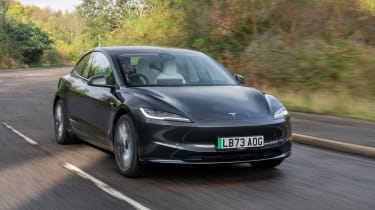
- Drag coefficient: 0.23 Cd
With the Tesla Model S now discontinued in the UK, it's the smaller Model 3 that becomes the American firm’s most aerodynamic car over here. With a drag coefficient of 0.23, it’s not quite as slippery as the Model S (which achieved a 0.208 Cd figure), but that still puts it safely within the top 10 most aerodynamic cars on sale.
The Tesla Model 3 has been a mighty sales success since it first went on sale in 2017. As one of the first affordable EVs with a decent range, the Model 3 has only improved over the years, with the latest model now achieving up to 390 miles on a charge. Importantly, the Tesla Model 3 is also one of the most efficient electric cars on sale today, meaning it’ll cover more miles per kilowatt hour (kWh) than pretty much every other EV.
9. Tesla Model Y
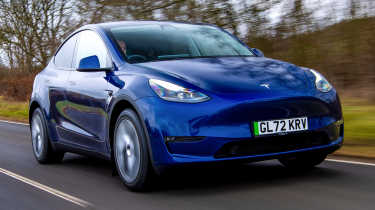
- Drag coefficient: 0.23 Cd
The SUV sibling to the Model 3, the Tesla Model Y somehow manages to achieve exactly the same drag coefficient, despite being taller, wider and longer. It shares near-identical front and rear end designs to the smaller car, but squeezes more passenger and boot space under its raised roof height.
Combine that slick bodywork with the same choice of batteries and motors as the Model 3, and you’re left with a spacious family EV that can manage up to 330 miles on a charge. Not quite as impressive as the Model 3, nor is it as efficient, but that doesn’t seem to matter to buyers – the Model Y was the best-selling car worldwide in 2023.
10. Volkswagen ID.7
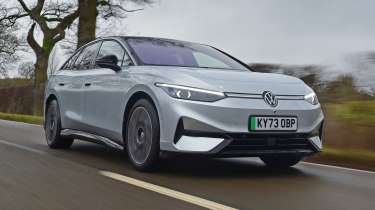
- Drag coefficient: 0.23 Cd
The Volkswagen ID.7 is the German marque’s flagship electric car, offering an alternative to other executive EVs such as the Polestar 2, BMW i4 and BYD Seal. Starting from over £51k, it’s the most expensive of the lot, but with up to 436 miles of range on offer, it’ll go the furthest on a charge. That’s in part due to its aero-optimised bodywork, which reduces drag and boosts range.
Some may find its simple looks a bit bland – especially at this price – but simplicity is the name of the game when it comes to reducing drag. An estate version is offered, too – the ID.7 Tourer – which is more practical and more interesting to look at, but the extra bodywork increases drag and reduces range marginally.
Check out our list of the best 4x4s on sale for a collection of some of the least aerodynamic cars you can buy…
Recommended
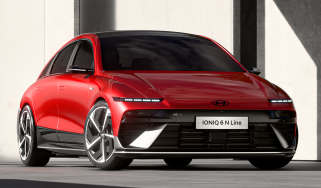
Hyundai Ioniq 6 gets steely-eyed styling overhaul for mid-life update
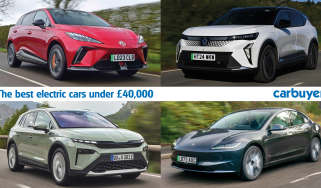
Best electric cars under £40,000 to avoid the luxury car tax
Most Popular
Tips & advice

Car dashboard warning lights: what does each symbol mean?

Electric car charging stations: public networks, charger types, apps and maps







